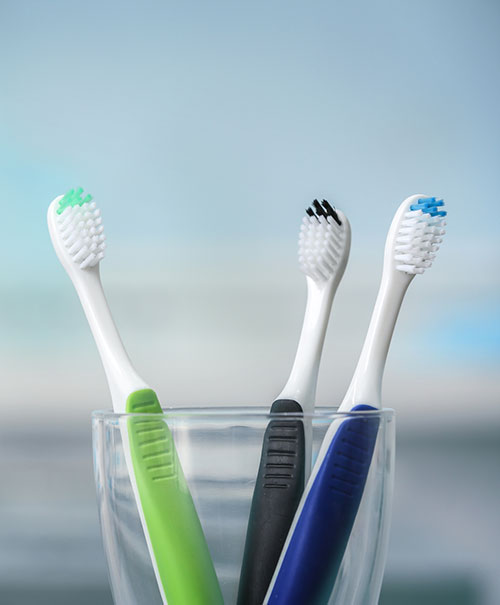Preventive Dentistry
Making preventive dentistry a regular part of your life is a smart move. Individuals who value preventive dentistry have less periodontal disease, tooth decay, and other problems requiring dental procedures down the road.
What is preventive dentistry?
- Taking good care of your teeth and gums at home with proper flossing and brushing techniques
- Visiting the dentist regularly for thorough cleanings and exams
- Utilizing fluoride and sealants, as recommended by your hygienist or dentist, to protect teeth and prevent cavities
- Awareness of how sugary, sticky foods can cause cavities, and enjoying certain food and drinks in moderation
- If indicated, wearing a night guard to protect your teeth from wear and/or fracture

Are You Brushing and Flossing Properly?
The most important step you can take to prevent cavities and periodontal disease is to brush and floss after meals or at least twice a day. If you are doing that already, congratulations! But are you doing it the right way? This is what we recommend:
Brushing
- Use a soft nylon bristled brush or an electric toothbrush.
- Hold the brush at the gum line at a 45-degree angle, making sure to cover the surface of your teeth just up to the gums, or soft tissue.
- To eliminate plaque and bacteria, gently clean the teeth and gums in a back and forth or circular motion. Clean the entire tooth, including the chewing surface and all sides, and take extra care to get the back teeth, which can be hard to reach.
- Use toothpaste that contains fluoride.
Flossing
- Take an 18-inch string of floss and wrap each end around your middle fingers until you have about two inches of floss to work with in between.
- Wind the floss around your finger to a clean section before moving on to the next tooth.
- To eliminate plaque and bacteria, gently clean the teeth and gums in a back and forth or circular motion. Clean the entire tooth, including the chewing surface and all sides, and take extra care to get the back teeth, which can be hard to reach.
Dental Checkups and Exams
Regular dental checkups and exams are as equally important as practicing good oral care at home. Cavities and periodontal disease still happen despite our best efforts. We recommend visiting us at least every six months for professional cleanings and exams. We also screen for oral cancer at every hygiene visit, and we take x-rays periodically to evaluate the bone for cysts and tumors.
Oral Health and Systemic Health
We know that the mouth is not isolated from the rest of the body. For example, uncontrolled periodontal disease exposes the body to chronic inflammation in response to the bacteria that causes periodontal disease. Recent research has particularly linked poor oral health with cardiovascular disease and diabetes. It is important to realize that a healthy mouth is part of a healthy lifestyle, and time and effort spent improving your oral health can help improve your overall health too.
Have a question or want to make an appointment?
Are you interested in learning more about your teeth? Do you have dental health goals you would like to meet? We would be honored to explore that with you and help you find solutions.



